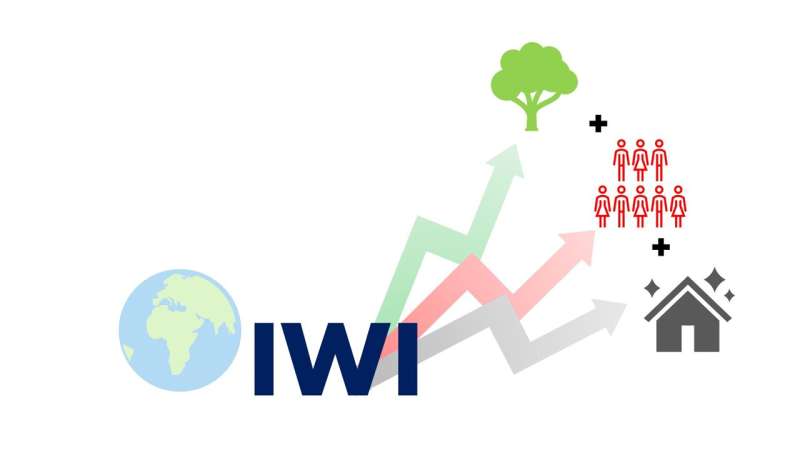This article has been reviewed according to Science X's editorial process and policies. Editors have highlighted the following attributes while ensuring the content's credibility:
fact-checked
proofread
Sustainable development in Africa shaped by subnational administrative capabilities, study shows

The Inclusive Wealth Index (IWI) is a sustainable development and economic progress metric that transcends the conventional means of measuring a nation's prosperity. This innovative metric offers a holistic portrayal of a country's affluence and welfare by considering three fundamental elements: natural, human, and produced capital. By synthesizing these factors, the IWI presents a unified and accessible assessment of the multifaceted dimensions inherent to the Sustainable Development Goals (SDGs).
The index proposed by the United Nations Environmental Program (UNEP) reshapes the global economic narrative and hopes to redefine the benchmarks of progress.
In their paper published in Environmental Development, Thierry Yerema Coulibaly and Shunsuke Managi of the Departments of Civil Engineering of Kyushu University elucidate sustainability-related spatial inequity in African provinces and the factors explaining them.
The study, "Subnational administrative capabilities shape sustainable development in Africa," explains the effect of government presence (informed by the national capital city in each province and transnational borders) and short-term income growth tradeoffs on long-term wealth management.
The study found that between 2012 and 2018, provincial inclusive wealth per capita rose modestly by 1%, signaling a weak sustainability performance due to a concurrent 1% yearly depletion of natural capital. Further examination revealed that while half of the provinces demonstrate synergy between income and wealth, the tradeoffs between these factors highlight the difficulties in reconciling short-term growth with long-term development.
The root of these tradeoffs lies in the failure to align income and natural capital growth. Furthermore, the findings reveal that national borders significantly delineate spatial disparities in wealth levels, variations, and compositions, with sustainability achievements extending beyond mere capital cities. Ultimately, the data underscores the importance of harmonizing national and subnational need-based interventions to foster sustainable development that yields nationwide benefits.
The lack of consistent government data for valuing capital stocks at the provincial level was a challenge because the estimation of the IWI necessitates a comprehensive array of data, including population statistics, educational attainment, investment in infrastructure, agricultural area sizes, and wildlife populations, among other factors. To mitigate this obstacle, the authors employed remote-sensing data and harnessed the outcomes of various subnational projects, ensuring a more robust and accurate analysis of the provincial landscape.
The researchers were able to map distributions of African wealth consistent with the literature on development economics on the continent. Notably, they demonstrated that provinces with capital cities were summits of agglomeration economies, not only in terms of income but also in terms of capital per capita. It suggests that, although estimates used approximations to cope with the lack of data, the research stepped in the same direction as common knowledge.
Prof Coulibaly hopes that through studies such as this people "can learn the concept of sustainability and how the sole focus on economic growth can be detrimental to future development."
The Inclusive Wealth Project aims to heighten public consciousness surrounding sustainable development. This initiative aspires to persuade global citizens of the importance of supplementing unidimensional growth indices, like GDP, with the more comprehensive IWI in devising policy. In order to achieve this ambitious goal, the project engages in collaborations with an array of stakeholders, including national governments, multinational organizations, and private-sector companies.
The UNEP Inclusive Wealth Report can be found here, and aims to provide a metric for measuring intergenerational human well-being across 140 countries, authored by Prof Shunsuke Managi in 2018.
Moving forward, the objective is to leverage the IWI as a tool for distilling sustainability information and making it accessible to a wide array of audiences. In pursuit of this goal, the team is dedicated to issuing annual reports on IWI and collaborate with esteemed international organizations such as UNESCO, UN-Habitat, and UNEP to bolster collective efforts in promoting sustainable development.
More information: Thierry Yerema Coulibaly et al, Subnational administrative capabilities shape sustainable development in Africa, Environmental Development (2023). DOI: 10.1016/j.envdev.2023.100817
Provided by Kyushu University




















